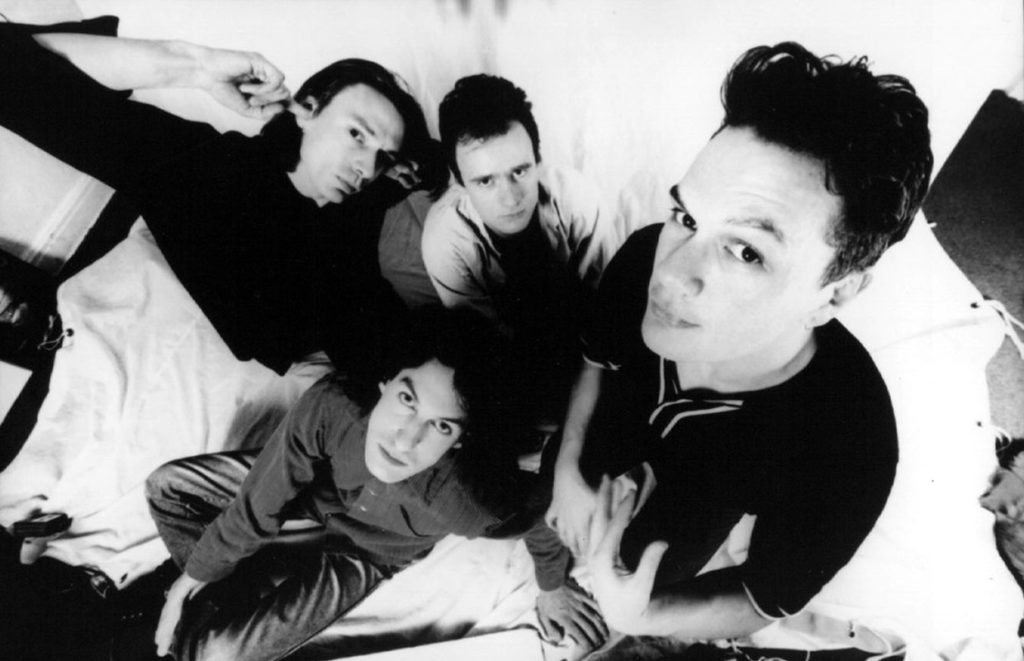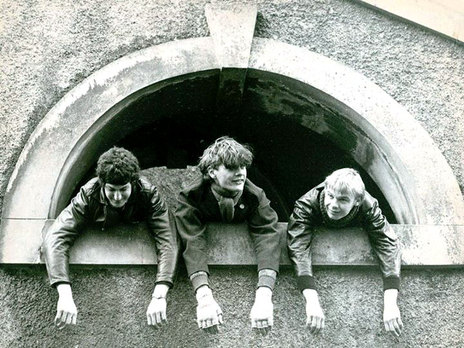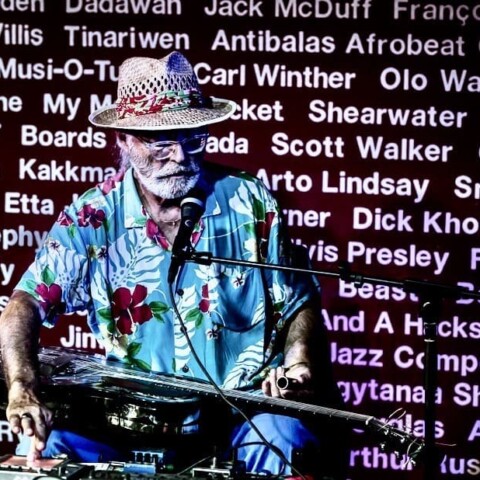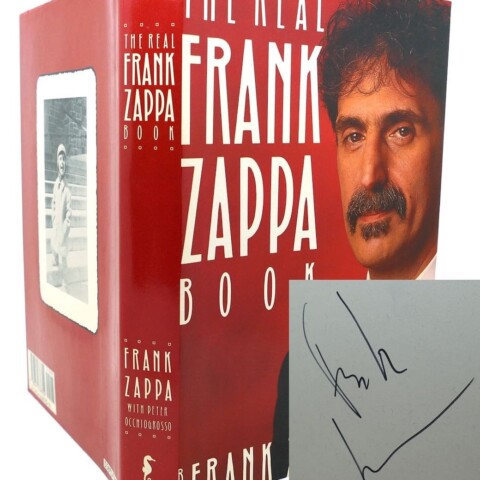Shayne Carter – Dead People I Have Known (Victoria University Press, $40) BOOK REVIEW
Summary
Shayne Carter – Dead People I Have Known (Victoria University Press, $40) BOOK REVIEW
Shayne Carter’s incredible memoir gives GARY STEEL a complex.
 For most of my adult life I’ve happily churned along with the knowledge that while I’d never make a great rock star, at least I can write a sentence or two. Typically, rock stars don’t write autobiographies, they employ ghostwriters to do so, and that’s because they can’t write for shit.
For most of my adult life I’ve happily churned along with the knowledge that while I’d never make a great rock star, at least I can write a sentence or two. Typically, rock stars don’t write autobiographies, they employ ghostwriters to do so, and that’s because they can’t write for shit.
Having now read Shayne Carter’s book, the assumption that I’d held all these years and which had kept me smugly happy with my lot has been dashed to small, sharp pieces. And every time I think about it, those little pricks re-insinuate their evil way back into my thought patterns. But that’s my problem.
The thing is, Shayne Carter writes like a bitch, which is my way of admitting that, going by the nearly 400 pages of words in Dead People I Have Known, he lays his world out lucidly, and with as much innate groove and dynamic and honesty and attitude as his music. Which means that, if what you’re looking for is a cracking set of yarns that give genuine insight on the life of one of New Zealand’s most interesting musicians, then luck’s on your table, tonight.
 By holing himself up in a bach at Aramoana with little of the outside world encroaching his headspace, Carter gave himself permission to focus on the key moments as he saw them, intuitively, rather then through the meticulously kept and then abandoned diaries that he admits he found repetitive and dull and obsessed with the minutiae of daily miseries. (He made the right call, although I died a bit when he admitted that he’d burnt the diaries without reading them, because I suspect that they might have contained the kind of nerdy details that music historians find useful.)
By holing himself up in a bach at Aramoana with little of the outside world encroaching his headspace, Carter gave himself permission to focus on the key moments as he saw them, intuitively, rather then through the meticulously kept and then abandoned diaries that he admits he found repetitive and dull and obsessed with the minutiae of daily miseries. (He made the right call, although I died a bit when he admitted that he’d burnt the diaries without reading them, because I suspect that they might have contained the kind of nerdy details that music historians find useful.)
An alternative title for this book could have been This Is Me & What I Think & I Take No Fucking Prisoners. It’s a bad title, but it sums up a book that’s neither quite an autobiography nor quite a memoir but a sort of hybrid that involves one heck of a lot of opining about people, events, music, whatever.
Carter flips back and forth in time in a way that’s usually treacherous for both novelists and documentarians because it tends to jolt the reader out of the story. But there’s enough chronology and Carter’s prose is so vivid and involving that somehow he pulls it off. And the narrative itself is just so compelling. I’ve known Carter casually for years, but had no idea about the extent of the dysfunction of his upbringing or the tragedies he’s endured, and he somehow looks straight in the eye of all of this without buckling and tells it all straight-forward, clear-eyed and without bravado.
 And yes, the list of the dead is long, and yes, he does explain exactly what happened – as far as he can remember – that horrendous day that his band mate in The DoubleHappys, Wayne Elsey, died on the train. In the years I’ve known Shayne I’ve never even thought to ask him about this incident and I’m glad of that, because it turns out that this awful split second in time nearly undid him and haunts him still. It’s the kind of tragedy someone should only have to recount once, and here’s the definitive version.
And yes, the list of the dead is long, and yes, he does explain exactly what happened – as far as he can remember – that horrendous day that his band mate in The DoubleHappys, Wayne Elsey, died on the train. In the years I’ve known Shayne I’ve never even thought to ask him about this incident and I’m glad of that, because it turns out that this awful split second in time nearly undid him and haunts him still. It’s the kind of tragedy someone should only have to recount once, and here’s the definitive version.
Would you want to read the book if you never really dug his music? I reckon. Carter has for many years been a voracious reader of non-fiction and his own account of his life story to date would be compelling if you’d never heard a note of Straitjacket Fits or Dimmer or any of his other bands or projects. There will be those who read it for its contextualising of the “Dunedin scene” and the Flying Nun label, and many more who still mourn the fact that “the Straitjackets” never quite achieved the international lift-off they deserved, and Carter does the only thing he can, which is to give his perspective on something he experienced.
 Some have commented that all the good stuff’s in the first 100 pages, but I disagree. I think those people have short attention spans, and yeah, nearly 400 pages is a lot to get through, but some of the most poignant parts are towards the end as he deals with the loss of both of his parents. Many autobiographies go flat towards the end because the artist’s glory years are well over, and they’re writing their book as a project in their dotage. This is clearly not Carter’s lot and although he ends the book not knowing if he’s ever going to make an album again, he’s involved in a wealth of creative projects, so there’s an “anything could happen” feel about it all.
Some have commented that all the good stuff’s in the first 100 pages, but I disagree. I think those people have short attention spans, and yeah, nearly 400 pages is a lot to get through, but some of the most poignant parts are towards the end as he deals with the loss of both of his parents. Many autobiographies go flat towards the end because the artist’s glory years are well over, and they’re writing their book as a project in their dotage. This is clearly not Carter’s lot and although he ends the book not knowing if he’s ever going to make an album again, he’s involved in a wealth of creative projects, so there’s an “anything could happen” feel about it all.
Did I mention that he’s often as funny as a fish? For all the melancholy and the disastrous relationships recounted there’s a darkly humorous element to the book and everyday observations that often had me in stitches. For instance, when he attends a dog show as a youth, “There was the dependable comedy of people looking like their dogs. The fat man with the pug, the redhead with the Irish setter, the blondes and their flouncing Afghans. The ladies with expensive perms, blowing hairspray over vain and precious poodles. A giant with a Great Dane.”
 Some of his descriptions give you a precise image of the time, place and grottiness, like that of his first flat: “My room was windowless and miniscule, with barely enough room for a bed. It was an ideal location for creative masturbation, and projectile vomiting if I got too drunk.” And: “One of our flatmates was the flyspray snorter from Cumberland street. He’d make half-baked suicide attempts on Saturday nights, and on Sunday mornings we’d have to wipe his blood off the kitchen knife to carve our bread.”
Some of his descriptions give you a precise image of the time, place and grottiness, like that of his first flat: “My room was windowless and miniscule, with barely enough room for a bed. It was an ideal location for creative masturbation, and projectile vomiting if I got too drunk.” And: “One of our flatmates was the flyspray snorter from Cumberland street. He’d make half-baked suicide attempts on Saturday nights, and on Sunday mornings we’d have to wipe his blood off the kitchen knife to carve our bread.”
He’s also great at encapsulating thoughts and feelings in short, controlled bursts, like this explanation on his first brush with punk rock: “Society, royalty, snooty form teachers and sneering rugger buggers – who wants to be part of that? I loved that the Pistols were scrawny and pimply – in their deliberate ugliness they were the exact opposite of what heroes were meant to be.”
Needless to say, Carter is equally insightful at describing just what’s great about a particular band or piece of music.

The only thing I didn’t like about Dead People I Have Known is that I ended up liking the Shayne Carter portrayed in this book less than the one I think I sort of know in real life, but then again, I didn’t like Miles Davis or Marianne Faithfull or Donovan Leitch much after reading their bios, either. It’s partly because you’re learning about the subject’s strength and weaknesses directly from the horse’s mouth, and sometimes the truth is unpalatable, as well as the way it’s couched.
Carter’s attitude is writ large and sometimes it palls. I don’t quite know where it comes from, and it’s not a pose but a position; it’s somewhere between a punk provocation and a Maori challenge. It’s enmeshed in his character and part of his dark humour, too, but maybe it’s also his weakest point. It’s as though everyone else has to prove their authenticity except him.
This “sensitive bad-ass” writes off former girlfriends as being too hippy or too damaged without really examining his own flaws. It’s a characteristic that’s staunch and uncharitable, and comes through in his bitter depiction of the music industry and its employees as being inherently poisonous. In Carter’s world, anyone involved with music who isn’t making music is a leech, below contempt. There’s no understanding of the graft that goes into the facilitation of music to find ears to hear it, nor the curatorial aspects of say, record shop employees or music critics. The only views Carter respects are those of his peer musicians. And even then, if he smells a rat, then open contempt often follows – check out his attitude to Neil Finn and Jordan Luck.
And ‘humble’ is a foreign concept to Carter. It’s hard to read him writing about himself as a natural born rock star, or describing his natural pull on women. Fair enough, false modesty is shit, but…

And yet, Dead People I Have Known isn’t just a good book, it’s a great one, perhaps the best rock musician memoir ever published in New Zealand. You don’t have to like everything about a person or what they say to appreciate a good story well written, and the flipside of the above conundrum (my conundrum, not Carter’s) is that his honesty makes it what it is. While Carter is circumspect enough not to use ex-girlfriends’ names he’s brave enough to discuss the people and situations he’s found himself in that are contemptible, and to implicate himself on occasion in discussing the disastrous impact of his miscellaneous bouts with alcohol.
“I could write a book on alcoholic disgrace, but it wouldn’t do anyone any good,” he writes. “It would add nothing to the literature of oblivion and wouldn’t make any of us feel better.”
While it was educational (and sometimes painful) to read about Straitjacket Fits’ long haul to nowhere and the weird split with Andrew Brough, the part of the book that meant the most to me was what came after: the story of Dimmer. I have to accept that I have a small stake in this part of the story: Shayne was a regular at my shop, Beautiful Music, in the years leading up to its release in 2001, and he would come by after hours to get inspired listening to the oddball electronica and experimental releases that I stocked. I ended up letting him store his gear in my previous premises and he met Malcolm Black from Sony at my shop and was subsequently signed to the label. Carter refers to me in the book as a music critic who wrote “snooty” reviews that pissed people off, and describes some of the music he first heard in my shop, including a major discovery in former Talk Talk singer Mark Hollis. But my appearance here is coincidental. Carter reckons that the first Dimmer album, I Believe You Are A Star, is the best thing he’s done and I agree, not because I played a small part in facilitating him at the time, but because all these years later, it sounds fresh, and as Carter writes: “I Believe You Are A Star can stand in any canon, and it’s a record that was apart from, and ahead, of its time.”

Really the only paragraph in the whole book that seems a bit off is the very last, because he’s suddenly getting over his fixation with the dark side and embracing the light like some fucking hippy. It felt like something a copy editor added just to make for a happy ending.
Apart from that, it’s almost too good.















